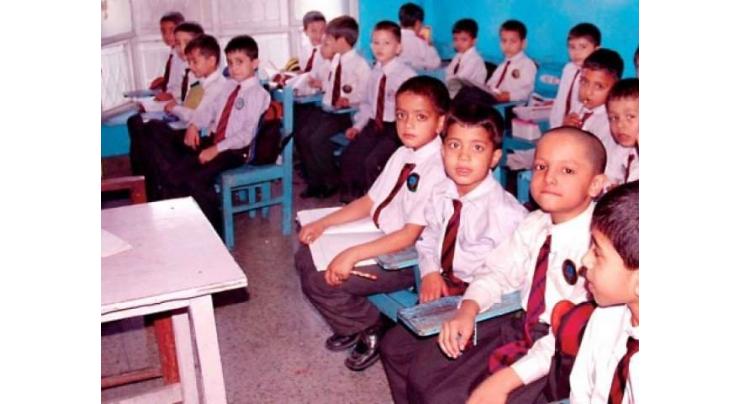
Out-of-school Children To Zero Requires 3.8 Percent Enrollment Growth Rate: UNDP
Rukhshan Mir (@rukhshanmir) Published May 18, 2018 | 10:35 PM

Pakistan needs to increase its current yearly growth rate of net enrollment from 0.92 percent to 3.8 percent to achieve the zero out-of-school children target by 2030
ISLAMABAD, (UrduPoint / Pakistan Point News - 18th May, 2018 ) :Pakistan needs to increase its current yearly growth rate of net enrollment from 0.92 percent to 3.8 percent to achieve the zero out-of-school children target by 2030.
The United Nations Development Program (UNDP) National Human Development Report-2017 (NHDR) has projected the prevailing enrollment growth rate ratio contributing to achieve the set the target, which is a decade away, in six long decades.
The report has anticipated that the government should expedite the current growth rate to bring the out-of-school children number down to zero to reap maximum fruits of its efforts, adding quality not quantity of education should be enhanced to uplift the stagnant literacy rate.
The report has revealed that Pakistan's progress in literacy and enrollments in the formal schooling system has been spoiled by persistent overlapping disparity in access to, and access in education.
It added that access to education refers to availability of educational institutions, admission procedures and infrastructure while access in explains the quality of the teaching and learning and the level of participation in school life.
"Poor access to education in Pakistan leads to the country having one of the world's lowest completion rates for Primary education. The abysmal levels of public spending on education under subsequent governments reflect on the poor quality of teaching and learning outcomes and inadequate infrastructure", says the report.
Incredibly 9.45 million children at primary level were estimated to be out of school in 2015. Pakistan is a signatory to various international commitments regarding the goal of universal education, like Education for All, the Millennium Development Goals (MDGs) and the Sustainable Development Goals (SDGs).
These commitments have been incorporated in the national agenda. Pakistan's Constitution recognizes free education as a right and accepts the provision of free and compulsory education as the State's responsibility.
Constitutional Amendment 18 (2010) states: 'The State shall provide free and compulsory education to all children of the age of five to sixteen years in such manner as determined by the law' (Article 25-A, Chapter 1, Fundamental Rights', Constitution of Pakistan 1973).
The report has emphasized the need that the government should revisits its definition of literacy as it counts Pakistan adopts a loose definition of literacy, bypassing the two critical components � numeracy and life skills.
The 1998 national census counts anyone 10 years or older as literate if they can "read a newspaper and write a simple letter in any language ". Pakistan has committed to the Education for All (EFA) goal that entails achieving a 50 percent improvement in adult literacy levels by 2015, along with equitable access of education for all.
However, the country still lags in its education targets.
Related Topics
Recent Stories

Robinson, bowlers help New Zealand go 2-1 up against Pakistan

Shahzeb Chachar to hold khuli kachehri on April 26

Heatwave amid Israel's aggression in Gaza brings new misery, disease risk

Tourism must change, mayor says as Venice launches entry fee

Court adjourns Judicial Complex attack case till May 17

Nasreen Noori’s book ‘Popatan Jahra Khwab’ launched

Wafaqi Mohtasib inspection team visits Excise and taxation office

AJLAC announces 5th Conference titled ‘People’s Mandate: Safeguarding Civil ..

Pak-US officials engage to enhance trade, investment ties

IBCC to promote educational excellence, expand regional presence

Pakistani 'Blue Helmets' serving UN Peacekeeping Mission in DR Congo set to leav ..

Putin says plans to visit China in May
More Stories From Education
-

Models, poster and quiz competition held at AIOU
5 hours ago -

AIOU to host 37th annual conference of AAOU in Oct
1 day ago -

SSC, HSSC annual exams in Sindh to be conducted in May
1 day ago -

BISE Larkana SSC exams start on May 02
1 day ago -

UUVAS arranges seminar to commemorate Allama Iqbal
1 day ago -

BISE Hyderabad to announce HSC-Il result exams on April 25
1 day ago
-

Eco-friendly agri technology imperative to overcome environmental pollution: Hina Hafeezullah
3 days ago -

Sindh to upgrade primary schools to reduce dropout rate
6 days ago -

SU extends deadline for submission of LLB (Hons) exam forms with late fee
6 days ago -

COMSTECH to hold 10th STEP on Facing Elderly
7 days ago -

Primary exams underway in Larkana
8 days ago -

SPSC starts viva of competitive exams 2020
8 days ago











